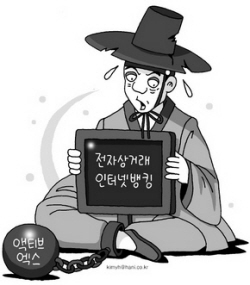
Daeheung Station, Seoul, February 2010
Speaking as an American, banking in Korea is somewhat of an alien experience. I'm used to online banking where I can log in anywhere at anytime, check my balance, and make a transfer or bill pay, even from my iPod.
But not in Korea. Oh, no. The Korean Internet runs on those nasty little buggers known as ActiveX controls. You know, those little creatures of the online netherworld that make their presence known through little pop-down bars that appear in Internet Explorer, asking you to allow them to install themselves like a little man dressed in Arial font with horns on his head and hooves for feet ringing your doorbell and inviting himself in for sweet tea. (Note: If you see this man, do not let him in your house. I read a short story in high school where the girl lets him in, bad things happen, and then at the end, it's all a dream. You wouldn't want to let him in and then find out your entire life was a dream, would you? Unless you have a really miserable life, or the real world you wake into is, like, super cool.) Remember them? That's ok—you probably haven't seen one in years.
In fact, it's better that way. Thats because ActiveX controls are bad things. They take forever to install, they slow everything down, they crap all over the registry; and as my old hogwon boss, Hanson, (who majored in computer science in Maryland) put it, it's lazy programming. Also, they're just plain annoying, and who likes annoying things? Not me, that's for sure, and neither should you. They're bad for your health.
Not to mention, we have (web) standards to adhere to. ActiveX, as a Microsoft-proprietary feature of Windows, is decidedly not standard, and doesn't play well with others. Besides, who even uses IE anymore, anyway? Sheesh.
Well, sadly, Korea does. And everything runs on ActiveX. And ActiveX only runs on Internet Explorer. In Windows.
Firefox? Too bad. Chrome? Haha, that's funny. And if you happen to have in your possession a specimen of that rare species of computer known as a Macintosh (once reportedly sighted in the wild at a coffee shop in Hongdae), you truly are up the the Han River without a paddle (and why would you bother getting one in the first place, since they're all Samsung and LG components inside, anyway).
The bottom line is that Korea became the world's most wired country with massive government backing. But while this intervention kickstarted the fiber optic infrastructure and moved hardware, the heavy-handed requirements for software to prevent against identity theft led programmers to embrace the easiest, most invasive method and predominant platform—ActiveX and Microsoft. (Also, as Hanson says, programmers are just lazy.) Keep in mind, this is from a nation that revered Bill Gates so much at the height of his powers that they took fashion cues from him. The result is that the long arms of the Evil Empire are still flopping around in the rim worlds, even though the head has already been cut off at the galactic core.
In this cartoon from the left-wing newspaper The Hankyoreh, the board reads "Electronic transactions / internet banking" and the ball says "ActiveX", or in Korean, "Aektibeu Aekseu".
Want to check your bank balance? You'll have to install an ActiveX control. Want to make a bank transfer? You'll have to to install another one, plus a standalone program that runs in your system tray, and pay to download a digital certificate file to your computer (which can only exist on one computer at a time, unless you download their software to transfer it to a USB drive which you will need to take with you if you want to make transfers from another computer), and type in a secret 4-digit code that the site directs you to construct from a table of random digits on a security token card issued to you by your bank.
Ok, does that sound like fun? I admit it, it is fun. It turns bank transfers into a labyrinthine exercise somewhat akin to decoding a secret Ovaltine message. But, you have to admit, it is a bit inconvenient.
Nevertheless, there are other upsides to banking in Korea. Paying bills online may be a pain, but it's super fun to do in person, thanks to the bill pay machines that make you feel like you're living in the future. For the uninitiated, it works something like this: You get your bill in the mail, printed on yellowed printer paper circa 1991, complete with the perforated strips of feeder holes on the edges. Printed in the corner will be a box with the letters "OCR". As you may have guessed, this probably stands for Optical Character Recognition, but who knows for sure; in practical terms, what it means is that your bill is magical.
You take this to the bank, to a magic machine next to the ATM. You wait in line; then, when it's your turn, hold up the rest of the line while you have lots of fun tearing off the the feeder hole strips. You try to remember the right sequence of buttons to push to enter bill-pay mode; they are all in Korean, and your Korean friend tried to translate them for you once, but you gave up and decided to just memorize the order. After failing to remember said order, you wave frantically at the attendant for help, who presses the buttons for you. You insert the bill into the machine. Then, magic occurs. When the magic is over, the machine displays the name of the bill sender and the amount of money they want from you. It asks you to confirm it, but since you don't read Korean very quickly, you decide not to hold up the line and trust the magical machine.
Anyway, the reason I bring this up is to say how surprised I was when, over the winter, the largest bank in Korea, Shinhan Bank, rolled out a huge marketing campaign touting its support for Mint.com, the online budgeting and financial planning site. I remembered it was a darling of tech blogs and Silicon Valley a couple years back, before it got bought out by Intuit, the makers of Quicken—but never did I see a shred of advertising for it in the real world. It does basically what Quicken does—allow you to track your expenses and budget your spending—but easier, more elegantly, and online, by automatically downloading your transaction history from your own bank's online banking service. No wonder Intuit bought them—Mint would have destroyed them.
And no wonder Shinhan Bank partnered with them—integration with an online banking service as intuitive and powerful as Mint is a—ahem—breath of fresh air.
EDIT: Since posting this, I've realized that Korea recently passed legislation undoing the ActiveX requirements for online banking! Huzzah!
mint and escalator
Sunday, August 01, 2010 | Posted by Mark Z at 4:36 AM |
Subscribe to:
Post Comments (Atom)

2 comments:
good old daeheung station.^^
nice post! the bill paying machines are awesome.^^ i never even tried to set up an online account. what bank did you use? we use woori just because our original hagwon set us up there. have heard that keb is better for foreigners, but have been too lazy to change. >_<
They are so cool! Wish we had them over here. ^^
Ahh, yeah I was with Hana. I heard that too about KEB; I think they even have—gasp—Mac-compatibility for online banking! ^^ And to be fair to Hana, right before I left, they unrolled an English version of their site.
Also, I just read that a law passed a month before I posted this that wiped out all the ActiveX requirements! lol. I really ought to amend it... I'm kinda disappointed in myself; I'd been working on this post since February, and now it's entirely inaccurate! :'-(
http://online.wsj.com/article/NA_WSJ_PUB:SB30001424052748703964104575334742135824042.html
Post a Comment